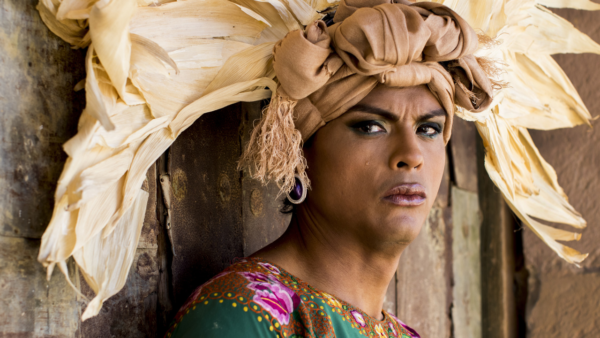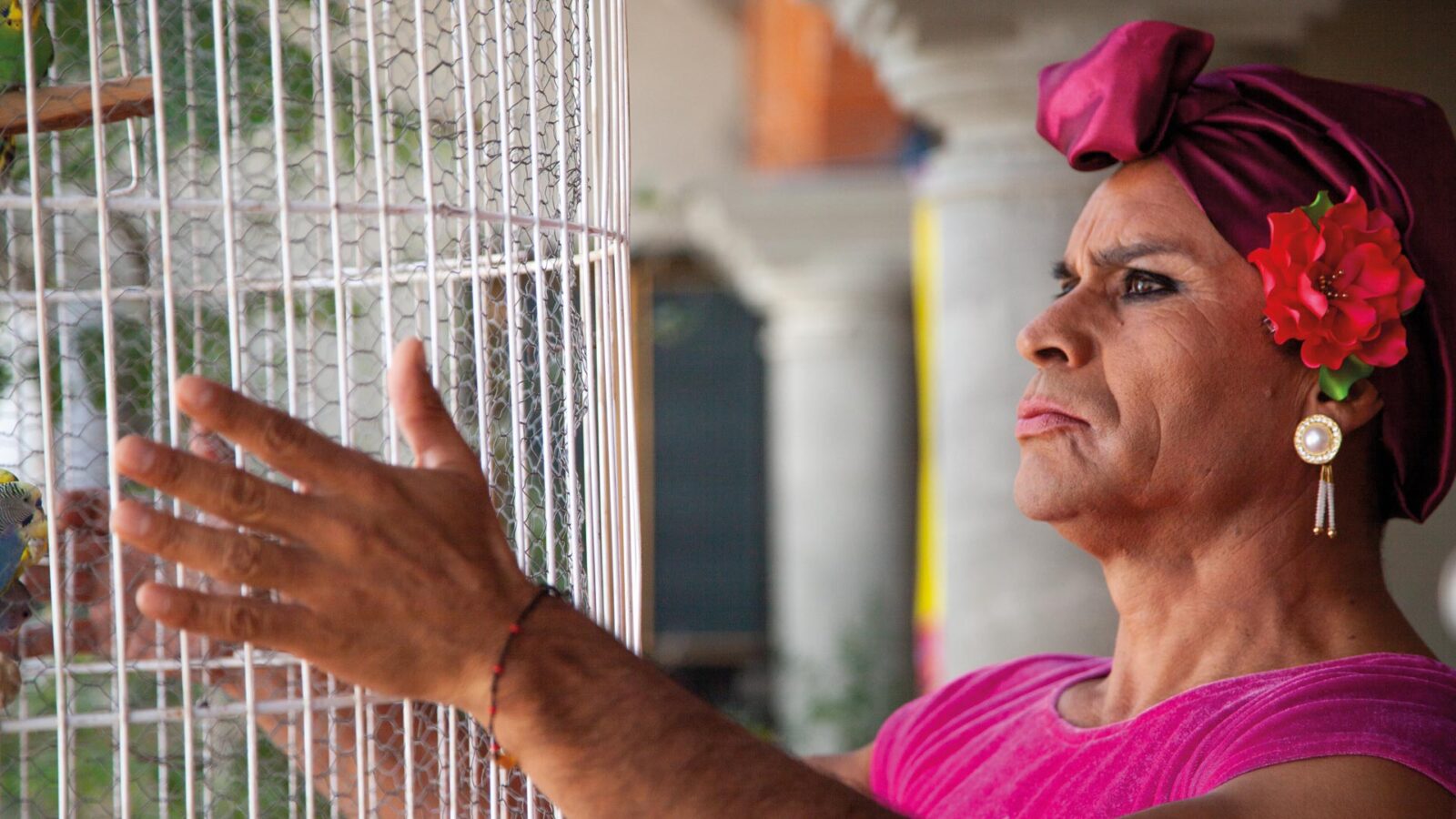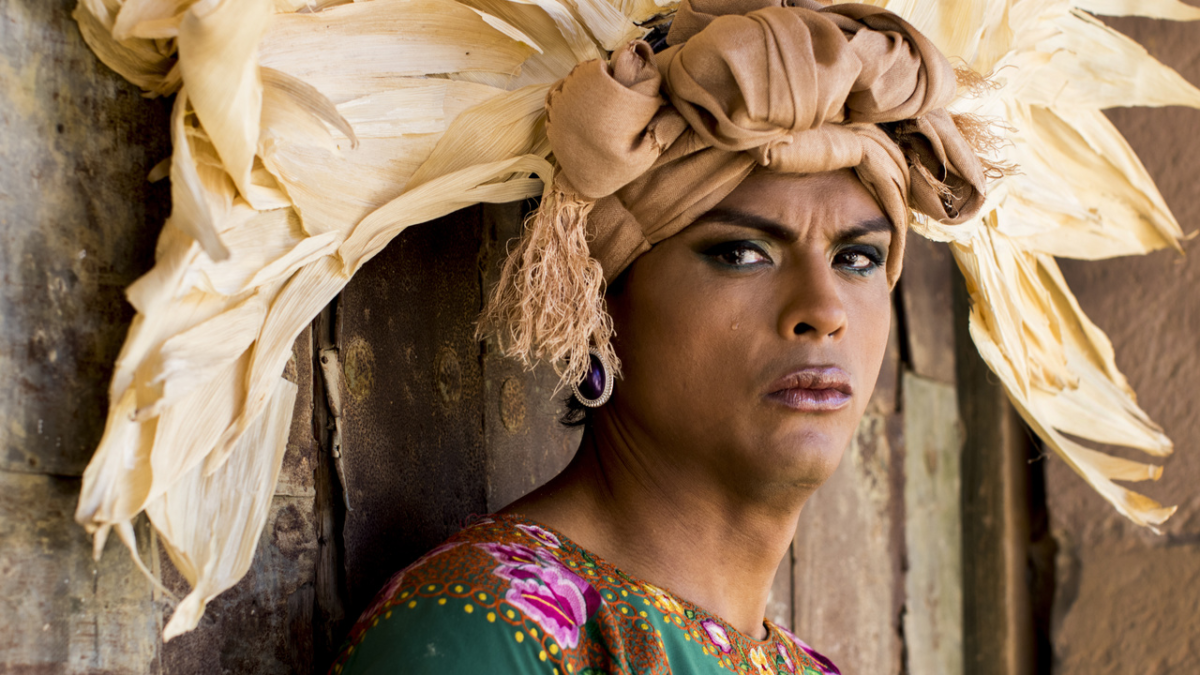
ON A CLEAR DAY YOU CAN SEE FROM OAXACA TO FINLANDIA…
The movie opens with the image of a boy listening to a conch shell that reminded me of the portrait of Edouard Boubat and also Nina Ricci´s Farouche perfume from 1973. After the boy´s poetic image we see a sequence of tragedies due to the Chiapas earthquake in the Isthmus región, presumably in 2017. A seashell is a recurrent object in this fictional film that takes place in the town of Oaxaca, Tehuantepec Isthmus, South of Mexico by the Pacific Ocean. There is no direct allusion to Juchitán, a city that is well known for its diverse community as shown in the documentaries “Muxes: Authentic, Intrepid, Seekers of Danger ” 2005 by Alejandra Islas, “Muxes” 2016 by Ivan Olit, and BBC´s News article of 2018 available on the internet. They all refer to the Zapotec civilization that speaks their own language and their roots go to pre-Hispanic times.
Zapotecs recognize Muxe as a third sex, as natural as to be man or woman, Muxes are men who consider themselves women, are celebrated as an integral part of a culture centered on femininity, and are considered a blessing for their mothers since will help at home and will take care of them until the end of their lives. It is important to notice that the Zapotec term “Muxe” is not comprehensible if one doesn´t know about their culture, Muxes relate to legendary origins.
The highlights of the film are both the sound and visuals. The soundtrack goes from vernacular and guttural sounds to Mahler´s 5th Symphony. Whilst the art direction and set decoration is stunning, with great takes that transport us to breathtaking places These are colorful and magical contexts that relate to nature and also to the fashion world. To be more specific, visualize a Tehuana dress which are the clothes and motifs of hand embroidery that inspired Frida Kahlo´s world-renowned style.
 The storytelling divides into two: First is the life of the locals and their cultural context. Male actors encarnate Delirio (Noé Hernández), poster image Amaranta (Cuauhtli Jiménez), Xquenda (Érick Israel Consuelo). They share a little of their own stories. They are a family in their own right that gets together to weave, sew, embroider, and talk about their lives, hopes, and dreams. Another Muxe friend quotes Truman “Chipotle” (aka Capote): “failure is the condiment that gives success its flavor” We see them in their complex domestic, social, and family contexts of sexual abuse since childhood, where mothers support them and fathers fuck up their lives. Muxes go to the Catholic church to set up things for baptisms, confirmations, first communions, and sweet fifteens, they participate in the local festivities and afterward get together in a small gathering to dance and make toasts with Mezcal.
The storytelling divides into two: First is the life of the locals and their cultural context. Male actors encarnate Delirio (Noé Hernández), poster image Amaranta (Cuauhtli Jiménez), Xquenda (Érick Israel Consuelo). They share a little of their own stories. They are a family in their own right that gets together to weave, sew, embroider, and talk about their lives, hopes, and dreams. Another Muxe friend quotes Truman “Chipotle” (aka Capote): “failure is the condiment that gives success its flavor” We see them in their complex domestic, social, and family contexts of sexual abuse since childhood, where mothers support them and fathers fuck up their lives. Muxes go to the Catholic church to set up things for baptisms, confirmations, first communions, and sweet fifteens, they participate in the local festivities and afterward get together in a small gathering to dance and make toasts with Mezcal.
In a haunting landscape by the sea, they go and talk to rock that is like the Oaxacan version of the Wailing Wall, it is the place where Muxes let go of their sorrows and release them with all their strength.
The second part of the storytelling refers to the actions of outsiders (Spanish people) that are interested in native weavings and textiles from Mesoamerica, specifically from Oaxaca, to replicate their colors and designs. In a board of directors´ meeting, they share classist and racist points of view and explain there is a very thin line between plagiarism and copying…and to conclude that what matters is to improve the originals to make them more beautiful so Europeans can wear them with more style. Unfortunately, the second plot, rich enough, is poorly developed and provides a strange resolution for Marta (Andrea Guasch) the Spanish woman that represents foreign interests.
In a casual al fresco meeting between Delirio, Amaranta and Martha, the older one says: “Since the Europeans arrived at the rainforests of America they say that they came to learn our way of life and create a bond with us… but never said what they were truly looking for… the indigenous people realized they were stealing the jungle´s spirit and therefore also their own souls…”
It is important to notice the well-known legal actions by Mayan women for the protection of their textile heritage and native designs from fashion global industries. ( \If you are interested read more about protection of collective intellectual property rights )
The drama is a set of customs and manners that introduces us to the Muxes cosmovision.and is so well worth watching
PS. Horacio Alcalá won the Golden Space Needle Award as best director for this film at the Seattle International Film Festival in 2022.
José Mayorga reviewed Finlandia at Miami's OUTshine Film Festival for future screenings contact https://www.facebook.com/coccinellefilm
Review by José Mayorga , Guatemala, Central America
lawyer and notary public, visual artist, and editor of El Azar Cultural, raised as a Catholic, lives and
works in Guatemala City. Cinema lover, curious about the possibilities life brings and eager to live
`the experience.

